Viscera, bones, tails, scales, skin scraps, meat trimmings, salt, blood, other juices… Have you ever stopped to think about how much waste is generated by the anchovy industry, that is, its salting and curing process? Canning companies catch or acquire huge quantities of fish, salt it to cure it and at the end of the process sell their fillets. The underlying issue is that during this process of enzymatic degradation of the protein due to contact with salt, which lasts for months, some byproducts appear that have traditionally been discarded or have been used for the production of fishmeal and feed. Gosh, why not pursue the essence of the Mediterranean, a umami squared and take gastronomic advantage of that potential treasure?
Pere Planagumà, the chef who held the position of head chef at Les Cols when the restaurant in Olot (Girona) achieved its two Michelin stars, asked himself that question and that challenge back in 2018 during a visit to the Anxoves de l's facilities. 'Scale. There he observed the residue with the prism of an entrepreneur. Although it has finally established a collaboration with Anxoves El discarding the anchovy, creating a range of new, Mediterranean, sustainable and circular economy flavourings. A model to share.”
Indeed, motivated by its desire to make the preparations tastier, Planagumà today uses a liquid fraction, undiluted salt during the salting process and the animal's own spine to shape a catalog of products designed to expand the palette of aromas and flavor is present when seasoning food. “They are unique in the market, providing glutamic acid in its purest form. All food transformation processes in contact with them generate a more intense and deeper range of flavor. The chef achieves a more unique and authentic proposal, as well as tastier. He gains flavor and intensity in his preparations,” he says, proud of “providing added value in our territorial area through gastronomic creativity.”
It's the fault of the Phoenicians
Activity in El Xillu It starts like any other brand in the sector, practically as the Phoenicians themselves did when they introduced this conservation method back in the year 1000 BC. The raw material is received (Engraulis encrasicholus), it is decapitated and placed in large blue drums with brine, alternating a layer of salt and another of whole raw anchovies. The drum is closed, a weight is placed on the lid to press the inside (this makes dehydration and bleeding easier), and it is not opened again until after a few months. Then the fish is rescued, which will have reached a reddish color and the desired aroma, and the concoction resulting from melting its own juices with the salt is discarded; It is thrown away, of course, unless, like Planagumà, you have the happy idea of using it to get a garum contemporary.
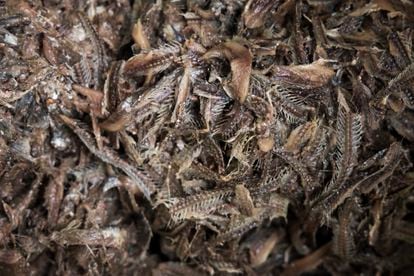
“Escata is a coupage of different phases of salting the anchovy, thickened (the ratio of ingredients is reduced to “anchovy essence” -water, salt, anchovy-, maltodextrin, xanthan gum) and bottled with a treatment that guarantees its food safety,” he clarifies. the Cook. The result is certainly pleasant, it constitutes a sensible substitute for salt and seems far removed from the memory of the garum original, that elixir of putrefaction (in the words of the writer Harold McGee) already present in times of Greek splendor and very popular among the Romans. Its now nauseating origin should not intimidate the 21st century consumer, since the creation of Planagumà, “developed today for today”, is a reinterpretation of that ancestral fermentation technique where the author himself appreciates “a thousand and one aromatic nuances: truffle, roasted shrimp, cured cheese…
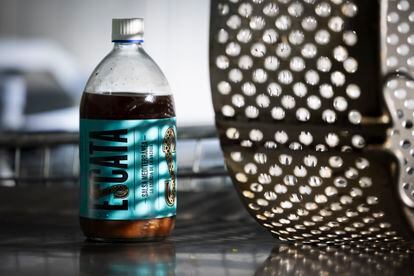
And it is from the melting pot of reminiscences of that “Mediterranean soy” that new references with a broad gastronomic application emerge, under the umbrella of Escatafood. Starting with the Oxygarum, made with vinegar chardonnay from Augustus Forum, ideal for preparations with fish, roasts, grilled, refried, as well as for Asian cuisine, also as a seasoning for sushi rice. And continuing with Escata Oli, a dressing based on olive oil and garum Mediterranean, “the perfect alliance to season salads, pizzas, roasts, etc.”
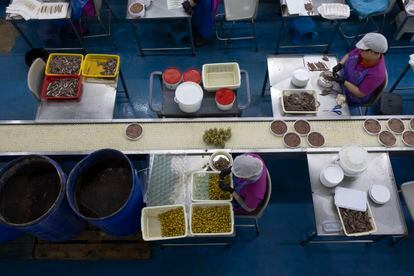
The salt that has not dispersed inside the barrels after a year in contact with its own garum (Xillu uses salt from Ibiza and the Ebro Delta), it is dried and presented as Escata Sal, “the first salt umami From the market”. And one of the most unique transformations still needs to be mentioned… The Girona cannery sells salted anchovies and anchovy fillets in olive oil, and it is the obtaining of the latter that generates an added by-product after the intervention of the sobadoras , whose meticulous work consists of separating both loins, cleaning them, trimming them and removing the spines appropriately with their hands and the help of scissors and lace. The central thorn, dried and ground, is what Pere uses to create a new 'spice' that he calls Escata Espina, it hides nuances of roasted coffee, again roasted shrimp and cocoa and, in fact, makes excellent crumbs with chocolate.
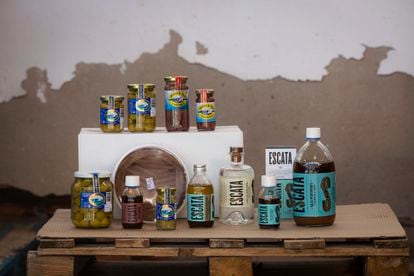
The limits of the possibilities of that katsoubushi They are yet to be specified, although he has already dared to explore them with Destil-Lat, a low-alcohol distillate (20%) of smoked anchovy spine, fennel and turmeric that he advertises as “ideal for dry and slightly bitter cocktails.” Thus, it combines perfectly with Negroni and Bloody Mary, for example.
Presence in six countries
With all of the above, Pere Planagumà has built a small, large, non-televised revolution, a clear example of use and sustainability that colleagues as renowned as Joan Roca (El Celler de Can Roca) already know from their own experience, who freeze-drys his garum and uses it for a tempura, or Albert Sastregener, in whose restaurant Bo.TiC also uses their products. More establishments such as Ca L'Enric (La Vall de Bianya), Els Tinars (Llagostera) or La Vinoteca (Olot), among others, appear in the client portfolio of this innovative firm that is already present in France, Germany, Italy, Norway and England.
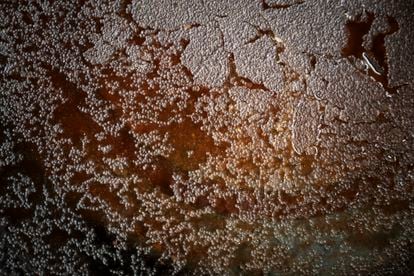
Escatafood, whose products can be purchased in stores such as Rooftop Smokehouse in Barcelona and websites like TöuFoodis just one of the current occupations of Planagumà, who also works as executive chef at Pilar and Juanito, a restaurant located in Valencia (Venezuela), and will soon launch an advisory service in Dubai. Among the domestic projects, the generation of a new specific flavoring stands out with all the losses from the Olot Market and the expansion of its portfolio with a novelty that will also provide an outlet for the anchovy tail and will follow the house's maxim: “Escatafood does not generates no pressure on its raw material supplier, of those byproducts generated during the fish salting process, since they must be at origin. This point is vital because, if not, the essence of the circular economy would be broken.”
/cloudfront-eu-central-1.images.arcpublishing.com/prisa/R5HJ2OQYIBBNNHYYIV5W27RVCE.jpg)
#Escatafood #Catalan #company #gourmet #products #anchovy #discards